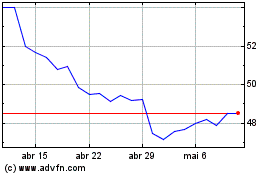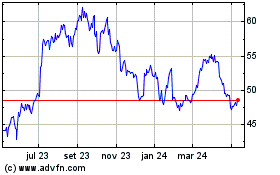Gloomy Outlook for Halliburton - Analyst Blog
13 Junho 2012 - 1:48PM
Zacks
Shares of Halliburton Company (HAL) are
currently trading close to its 52-week low of $27.21. The oilfield
services behemoth has seen its share price fall approximately 22%
since the beginning of March this year, as investors have been
selling the stock for its weak fundamentals and tepid outlook. A
recent warning issued by the company about its second quarter
profitability has added to this bearishness.
Houston, Texas-based Halliburton is one of the largest oilfield
service providers in the world, offering a variety of equipment,
maintenance and engineering and construction services to the
energy, industrial and government sectors. The company operates
under two main segments: Completion and Production, and Drilling
and Evaluation.
Halliburton recently cautioned investors that a
higher-than-expected spike in the cost for guar gums – a key
constituent of the company’s market-leading ‘hydraulic fracturing’
procedure – will adversely impact its second quarter
results.
Guar gum, a bean grown mostly in India, apart from being a dairy
products thickener is also a main ingredient of the hydraulic
fracturing (or fracking) process, which is used to extract natural
gas by blasting underground rock formations with a mixture of
water, sand and chemicals.
As per Halliburton, demand for guar gum has gone through the
roof in North America following the growing use of hydraulic
fracturing in the extraction of oil and natural gas liquids from
shale. This has led to concerns about the commodity’s potential
shortage later in 2012, thereby driving up guar gum prices more
rapidly than previously thought.
The rising costs, according to the company, have affected its
second quarter profitability in North America more than expected.
The world's second-largest oilfield services firm after
Schlumberger Ltd. (SLB) now sees margins in the
region to be down by 300 basis points more than the previous
forecast of a 200–250 basis points squeeze, implying a 500–550
point drop from the first-quarter levels.
Additionally, the North American land rig count, which has
experienced strong upward momentum over the last twelve months, may
plateau in the near future as growth in highly-productive
horizontal drilling has led to a natural gas supply overhang and
relatively weak natural gas prices in the U.S. market. This is
likely to be only partially offset by the continued growth of oil-
and liquids-rich reservoirs. A slowdown in U.S. land drilling will
adversely impact Halliburton’s business.
Lastly, we expect Halliburton shares to remain soft until it
fully works its way through claims related to the Deepwater Horizon
incident. We are also concerned by the slow and geographically
uneven recovery in Halliburton’s international markets.
Given these concerns, we expect Halliburton to perform below its
peers and industry levels in the coming months. As such, we see
little reason for investors to own the stock. Our bearish
investment thesis is supported by a Zacks #4 Rank (short-term Sell
rating).
Partially offsetting these negatives are the company’s leading
position in the global oilfield services market, its broad and
technologically-complex product/service offerings, and its robust
financial profile.
HALLIBURTON CO (HAL): Free Stock Analysis Report
SCHLUMBERGER LT (SLB): Free Stock Analysis Report
To read this article on Zacks.com click here.
Zacks Investment Research
Schlumberger (NYSE:SLB)
Gráfico Histórico do Ativo
De Ago 2024 até Set 2024

Schlumberger (NYSE:SLB)
Gráfico Histórico do Ativo
De Set 2023 até Set 2024
